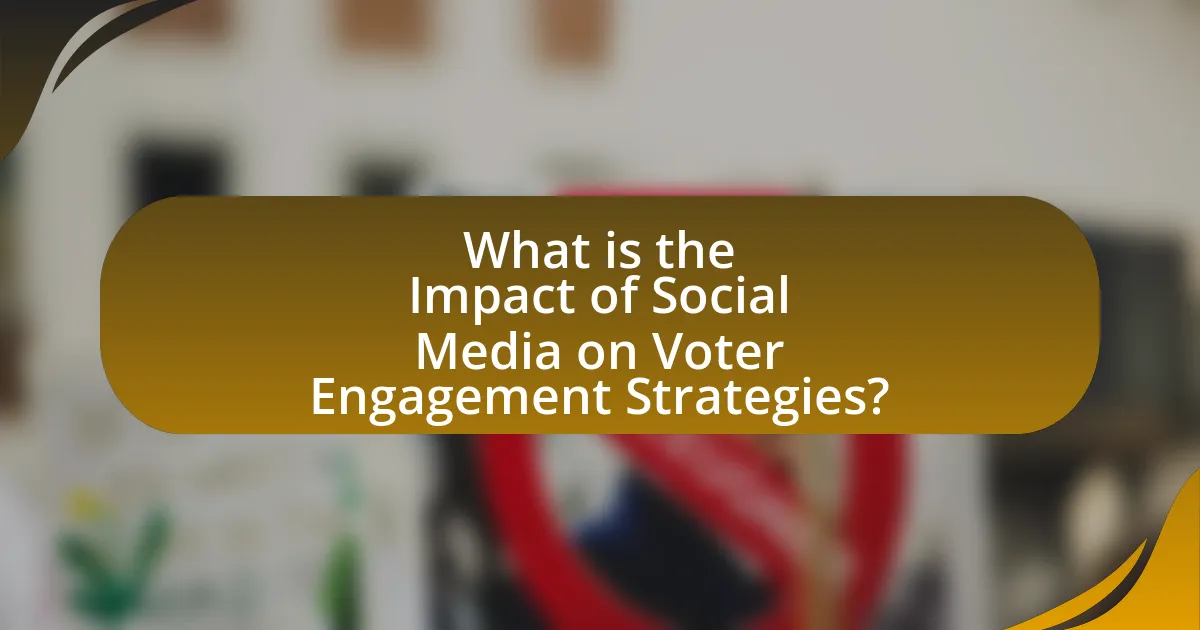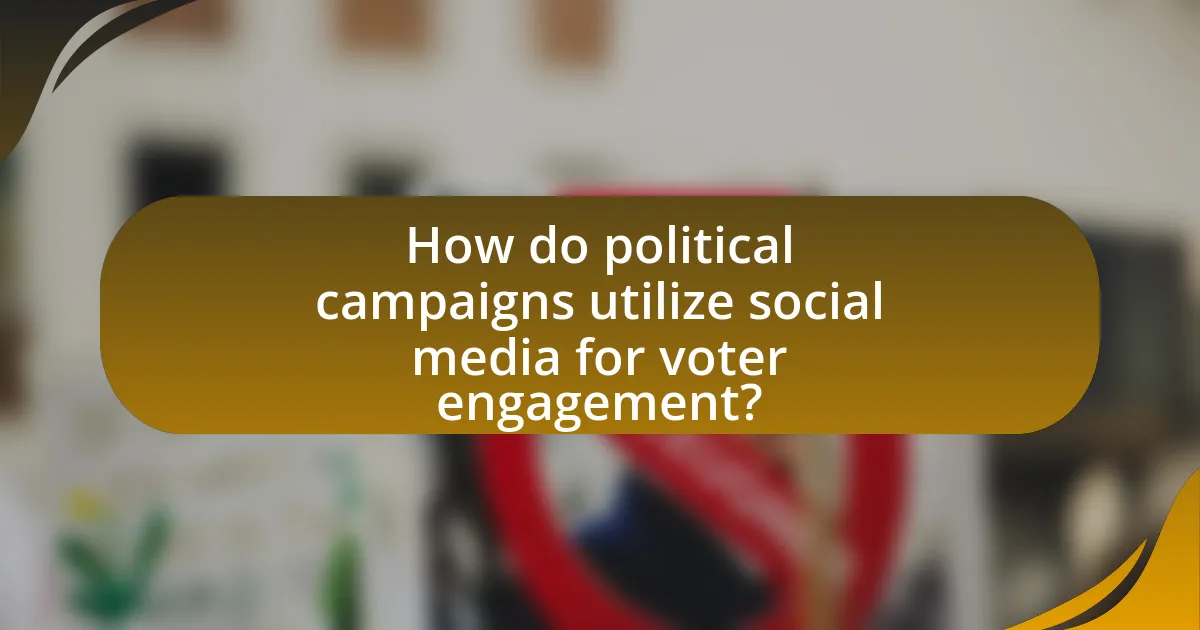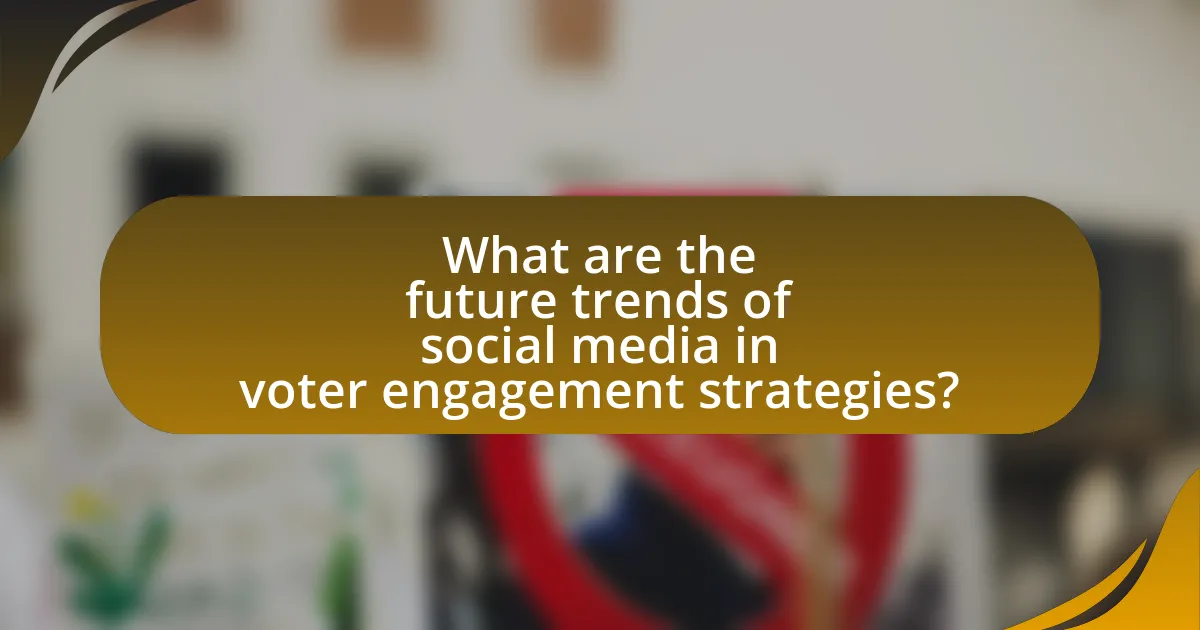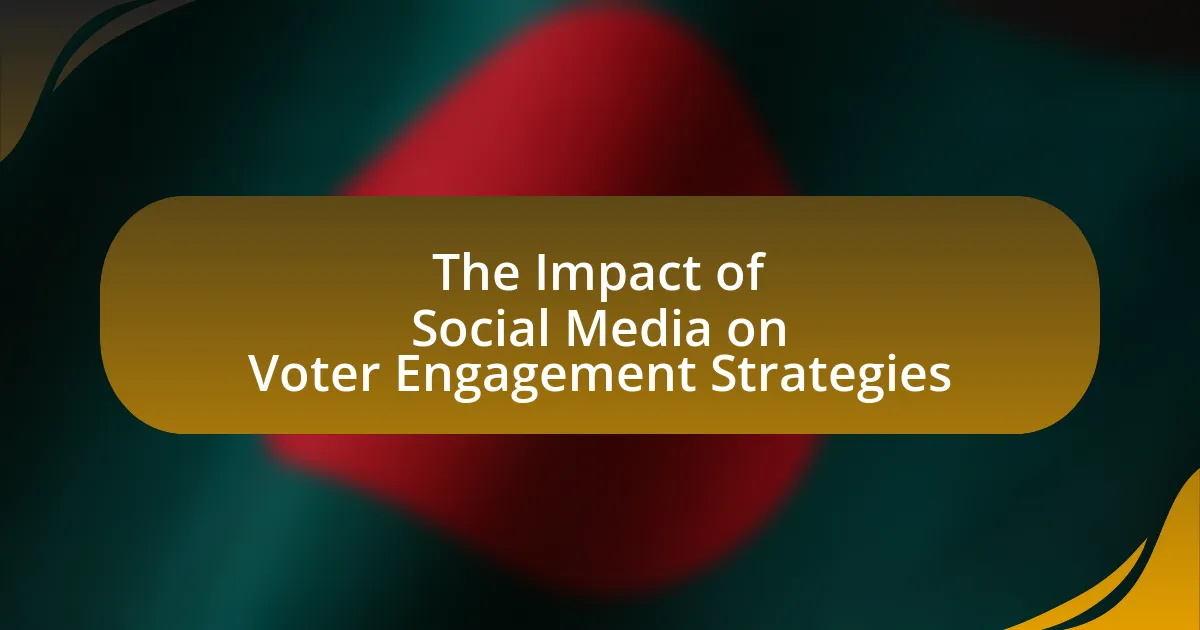The article examines the impact of social media on voter engagement strategies, highlighting how platforms like Facebook, Twitter, and Instagram facilitate direct communication between candidates and voters. It discusses the transformation of voter engagement through interactivity, targeted advertising, and real-time information sharing, emphasizing the importance of these features in mobilizing diverse demographics. The article also addresses challenges such as misinformation and privacy concerns, while exploring how political campaigns and grassroots movements effectively utilize social media to enhance civic participation and voter turnout. Additionally, it outlines future trends and best practices for leveraging technology in voter outreach.

What is the Impact of Social Media on Voter Engagement Strategies?
Social media significantly enhances voter engagement strategies by facilitating direct communication between candidates and voters. Platforms like Facebook, Twitter, and Instagram allow political campaigns to reach a broader audience, mobilize supporters, and encourage participation in elections. For instance, a study by the Pew Research Center found that 69% of adults in the U.S. use social media, making it a crucial tool for campaigns to disseminate information and rally support. Additionally, social media enables targeted advertising, allowing campaigns to tailor messages to specific demographics, thereby increasing the likelihood of voter turnout.
How has social media changed the landscape of voter engagement?
Social media has fundamentally transformed voter engagement by enabling direct communication between candidates and voters, fostering greater participation and mobilization. Platforms like Facebook and Twitter allow political campaigns to reach a wider audience instantly, facilitating real-time interaction and feedback. According to a 2020 Pew Research Center study, 53% of U.S. adults reported that social media played a significant role in their political engagement, highlighting its influence on voter awareness and turnout. Additionally, social media campaigns can target specific demographics with tailored messages, increasing the effectiveness of outreach efforts. This shift has led to a more informed electorate and has changed traditional campaigning methods, making voter engagement more dynamic and accessible.
What are the key features of social media that influence voter engagement?
The key features of social media that influence voter engagement include interactivity, targeted advertising, and real-time information sharing. Interactivity allows users to engage directly with candidates and campaigns, fostering a sense of community and involvement. Targeted advertising enables campaigns to reach specific demographics based on user data, increasing the likelihood of engagement from potential voters. Real-time information sharing facilitates immediate dissemination of news and updates, keeping voters informed and engaged in ongoing political discussions. Research by the Pew Research Center indicates that 69% of adults in the U.S. use social media, highlighting its significant role in shaping political opinions and mobilizing voters.
How do different demographics interact with social media for voting purposes?
Different demographics interact with social media for voting purposes in varied ways, influenced by factors such as age, ethnicity, and socioeconomic status. For instance, younger voters, particularly those aged 18-29, are more likely to use platforms like Instagram and TikTok to engage with political content, while older demographics tend to favor Facebook for similar interactions. Research by the Pew Research Center indicates that 50% of younger voters reported using social media to learn about candidates and issues, compared to only 25% of voters aged 65 and older. Additionally, ethnic minorities often utilize social media to mobilize their communities, with studies showing that Black and Hispanic voters are more likely to share political content and encourage voting through platforms. This demographic engagement highlights the role of social media as a critical tool for voter outreach and education across different groups.
Why is voter engagement important in democratic processes?
Voter engagement is crucial in democratic processes because it ensures that the electorate actively participates in decision-making, thereby reflecting the will of the people. High levels of voter engagement lead to more representative governance, as evidenced by studies showing that increased voter turnout correlates with policies that better align with public preferences. For instance, the U.S. Census Bureau reported that in the 2020 presidential election, states with higher voter turnout saw more progressive policies enacted, demonstrating the direct impact of engaged voters on legislative outcomes.
What role does voter turnout play in elections?
Voter turnout is crucial in elections as it directly influences the outcome and legitimacy of the electoral process. Higher voter turnout typically reflects greater public engagement and can lead to the election of candidates who better represent the electorate’s preferences. For instance, in the 2020 U.S. presidential election, voter turnout reached approximately 66.8%, the highest for a presidential election since 1900, which significantly impacted the results and highlighted the importance of mobilizing voters.
How can social media enhance civic participation among voters?
Social media enhances civic participation among voters by providing platforms for information dissemination, community engagement, and mobilization efforts. These platforms allow voters to access real-time updates on political issues, candidates, and voting procedures, which increases awareness and knowledge. For instance, a study by the Pew Research Center found that 69% of adults in the U.S. use social media, making it a vital tool for reaching a broad audience. Additionally, social media facilitates discussions and interactions among voters, fostering a sense of community and encouraging collective action, as evidenced by movements like #BlackLivesMatter, which mobilized significant voter turnout. Furthermore, targeted advertising on social media can effectively reach specific demographics, ensuring that messages resonate with diverse voter groups, thereby enhancing overall civic participation.
What challenges do social media platforms present for voter engagement?
Social media platforms present significant challenges for voter engagement, primarily due to misinformation, algorithmic bias, and the digital divide. Misinformation can spread rapidly on these platforms, leading to confusion among voters about candidates and issues; for instance, a study by the Pew Research Center found that 64% of Americans believe that fabricated news stories cause a great deal of confusion about the basic facts of current events. Algorithmic bias can limit exposure to diverse viewpoints, as platforms often prioritize content that generates engagement, which may not include important electoral information. Additionally, the digital divide affects voter engagement, as individuals without reliable internet access or digital literacy skills are less likely to participate in online discussions or access vital voting information, with the U.S. Census Bureau reporting that approximately 14% of Americans lack internet access. These factors collectively hinder effective voter engagement on social media platforms.
How does misinformation on social media affect voter decisions?
Misinformation on social media significantly influences voter decisions by shaping perceptions and beliefs about candidates and issues. Studies indicate that exposure to false information can lead to altered voting preferences, as individuals may base their choices on misleading narratives rather than factual data. For instance, a 2019 study published in the journal “Political Communication” found that misinformation can decrease trust in electoral processes and increase polarization among voters. This effect is exacerbated by algorithms that prioritize sensational content, further entrenching voters in echo chambers where misinformation thrives.
What are the privacy concerns related to voter data on social media?
Privacy concerns related to voter data on social media include unauthorized access, data breaches, and the potential for misuse of personal information. Social media platforms often collect extensive data on users, including their political preferences and voting behavior, which can be exploited by third parties for targeted advertising or manipulation. For instance, the Cambridge Analytica scandal highlighted how personal data from Facebook was harvested without consent to influence voter behavior in elections. Additionally, the lack of stringent regulations on data protection increases the risk of sensitive voter information being exposed or misused, raising significant ethical and legal issues surrounding voter privacy.

How do political campaigns utilize social media for voter engagement?
Political campaigns utilize social media to enhance voter engagement by creating targeted content, fostering direct communication, and mobilizing supporters. Campaigns leverage platforms like Facebook, Twitter, and Instagram to share tailored messages that resonate with specific demographics, thereby increasing the likelihood of voter interaction. For instance, during the 2020 U.S. presidential election, candidates used social media to reach younger voters, with 50% of voters aged 18-29 reporting they were influenced by social media content. Additionally, social media allows campaigns to engage in real-time conversations, respond to voter inquiries, and address concerns, which builds a sense of community and trust. The ability to organize events and encourage voter turnout through social media channels further exemplifies its effectiveness, as seen in the mobilization efforts that led to record voter participation in recent elections.
What strategies do campaigns employ on social media to reach voters?
Campaigns employ targeted advertising, content creation, and engagement tactics on social media to reach voters. Targeted advertising allows campaigns to deliver tailored messages to specific demographics based on data analytics, increasing the likelihood of voter engagement. For instance, the 2020 U.S. presidential campaigns utilized Facebook’s advertising tools to reach millions of potential voters by segmenting audiences according to age, location, and interests. Content creation involves producing shareable posts, videos, and infographics that resonate with voters’ values and concerns, enhancing visibility and fostering community discussions. Engagement tactics, such as responding to comments and hosting live Q&A sessions, create a sense of connection and trust between candidates and voters, as evidenced by the high interaction rates seen during the 2016 election cycle. These strategies collectively enhance voter outreach and mobilization efforts.
How do targeted advertisements influence voter behavior?
Targeted advertisements significantly influence voter behavior by tailoring messages to specific demographics, thereby increasing engagement and persuasion. Research indicates that personalized ads can enhance voter turnout by addressing individual concerns and preferences, as demonstrated in the 2016 U.S. presidential election, where targeted social media campaigns effectively mobilized key voter segments. A study by the Pew Research Center found that 62% of social media users encountered political content that influenced their voting decisions, highlighting the effectiveness of targeted strategies in shaping voter attitudes and actions.
What role do influencers play in shaping voter opinions on social media?
Influencers play a significant role in shaping voter opinions on social media by leveraging their reach and credibility to disseminate political messages. Their ability to engage large audiences allows them to sway public perception and encourage voter participation. For instance, a study by the Pew Research Center found that 70% of young voters are influenced by social media personalities when making political decisions. This demonstrates that influencers can effectively mobilize their followers, promote specific candidates or issues, and ultimately impact electoral outcomes.
How do grassroots movements leverage social media for engagement?
Grassroots movements leverage social media for engagement by utilizing platforms to mobilize supporters, disseminate information, and foster community interaction. These movements create targeted campaigns that resonate with specific audiences, often employing hashtags and viral content to increase visibility and participation. For instance, the Black Lives Matter movement effectively used Twitter and Instagram to organize protests and share real-time updates, resulting in widespread participation and awareness. Research indicates that social media can amplify grassroots efforts, with studies showing that 70% of young voters engage with political content online, highlighting the platform’s role in shaping voter engagement strategies.
What are some successful examples of grassroots campaigns using social media?
Successful examples of grassroots campaigns using social media include the Ice Bucket Challenge and the Black Lives Matter movement. The Ice Bucket Challenge, which went viral in 2014, raised over $115 million for ALS research through social media engagement, demonstrating how a simple challenge can mobilize widespread participation and donations. The Black Lives Matter movement, initiated in 2013, utilized platforms like Twitter and Facebook to organize protests and raise awareness about racial injustice, significantly influencing public discourse and policy discussions. These campaigns illustrate the power of social media in amplifying grassroots efforts and fostering community engagement.
How can community organizations effectively use social media to mobilize voters?
Community organizations can effectively use social media to mobilize voters by creating targeted campaigns that engage specific demographics. These organizations can utilize data analytics to identify and reach potential voters through tailored messaging that resonates with their interests and concerns. For instance, a study by the Pew Research Center found that 69% of adults in the U.S. use social media, making it a powerful tool for outreach. By leveraging platforms like Facebook, Twitter, and Instagram, organizations can share informative content, organize events, and encourage voter registration, thereby increasing participation rates. Additionally, engaging storytelling and interactive content, such as polls and live Q&A sessions, can foster community involvement and motivate individuals to vote.

What are the future trends of social media in voter engagement strategies?
Future trends of social media in voter engagement strategies include increased use of artificial intelligence for personalized outreach, enhanced data analytics for targeted messaging, and the rise of short-form video content to capture attention. Social media platforms are increasingly leveraging AI to analyze user behavior and preferences, allowing campaigns to tailor their messages effectively. For instance, a study by the Pew Research Center found that 69% of adults in the U.S. use social media, making it a critical channel for reaching voters. Additionally, the use of data analytics enables campaigns to identify and engage specific demographics, improving voter turnout. The popularity of platforms like TikTok demonstrates the effectiveness of short-form video content in engaging younger voters, as evidenced by the significant increase in political content consumption among Gen Z users during recent elections.
How is technology evolving to enhance voter engagement through social media?
Technology is evolving to enhance voter engagement through social media by integrating advanced data analytics, artificial intelligence, and interactive platforms. These innovations allow political campaigns to target specific demographics with tailored messages, increasing the likelihood of voter participation. For instance, platforms like Facebook and Twitter utilize algorithms that analyze user behavior and preferences, enabling campaigns to deliver personalized content that resonates with individual voters. Additionally, features such as live streaming and interactive polls foster real-time engagement, allowing voters to participate in discussions and express their opinions directly. According to a study by the Pew Research Center, 69% of adults in the U.S. use social media, highlighting its potential as a powerful tool for mobilizing voters and facilitating civic engagement.
What emerging platforms are likely to influence future voter engagement?
Emerging platforms likely to influence future voter engagement include TikTok, Discord, and Clubhouse. TikTok’s rapid growth among younger demographics allows for creative and engaging political content, which can drive voter awareness and participation. Discord, originally a gaming platform, has evolved into a space for community building and discussion, enabling grassroots organizing and real-time communication among voters. Clubhouse offers audio-based discussions that facilitate direct interaction between political figures and constituents, fostering a sense of community and engagement. These platforms are reshaping how political messages are disseminated and how voters interact with candidates and each other, as evidenced by their increasing use in recent electoral campaigns.
How can artificial intelligence improve voter outreach on social media?
Artificial intelligence can improve voter outreach on social media by enabling targeted messaging and personalized engagement strategies. AI algorithms analyze user data to identify demographics, interests, and behaviors, allowing campaigns to tailor their content effectively. For instance, a study by the Pew Research Center found that targeted ads on social media can increase engagement rates by up to 50%, demonstrating the effectiveness of AI-driven strategies in reaching specific voter segments. Additionally, AI chatbots can facilitate real-time interactions, answering voter inquiries and providing information on polling locations, which enhances voter accessibility and participation.
What best practices should campaigns follow for effective social media engagement?
Campaigns should prioritize authentic interaction, consistent messaging, and data-driven strategies for effective social media engagement. Authentic interaction fosters trust and builds community, as studies show that 70% of consumers feel more connected to brands that engage with them on social media. Consistent messaging across platforms ensures clarity and reinforces brand identity, which is crucial for voter recognition and recall. Data-driven strategies, including analyzing engagement metrics and audience insights, enable campaigns to tailor content effectively, leading to a 30% increase in engagement rates when campaigns adapt based on audience feedback.
How can campaigns measure the effectiveness of their social media strategies?
Campaigns can measure the effectiveness of their social media strategies through key performance indicators (KPIs) such as engagement rates, conversion rates, and reach. Engagement rates, which include likes, shares, and comments, indicate how well the content resonates with the audience. Conversion rates track the number of users who take a desired action, such as signing up for a newsletter or donating, directly linked to social media efforts. Reach measures the total number of unique users who see the content, providing insight into the campaign’s visibility. According to a study by the Pew Research Center, 69% of adults in the U.S. use social media, highlighting its potential impact on voter engagement and the importance of measuring these metrics to assess strategy effectiveness.
What ethical considerations should be taken into account when engaging voters on social media?
When engaging voters on social media, ethical considerations include transparency, accuracy, and respect for privacy. Transparency requires that organizations disclose their affiliations and funding sources to avoid misleading voters about the information presented. Accuracy is crucial, as spreading misinformation can undermine democratic processes; for instance, a study by the Pew Research Center found that 64% of Americans believe fabricated news stories cause confusion about basic facts. Respect for privacy involves safeguarding personal data and ensuring that voter information is not exploited for manipulative purposes. These considerations are essential to maintain trust and integrity in the electoral process.
